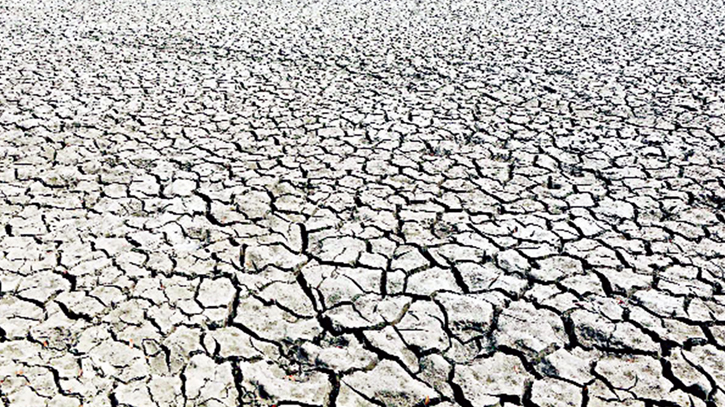
In Jhalakathi, the river, canals, ditches, ponds, and bill have dried up, causing cracks in the soil and turning it into a desert. Photo- Collected.
Intense heat is going on across the country on the one hand, and load shedding is increasing along with it. The temperature has already crossed 41 degrees Celsius.
High heatwaves, prolonged droughts, and adverse weather conditions across the country are reducing human performance. As a result, the production of boro paddy, mango, and litchi is feared to be disrupted.
Weather experts said that the temperature may rise further. The impact of heat waves on the agricultural sector is severe. Rising temperatures due to climate change will increase drought levels in the coming days.
It will also reduce the availability of water for irrigation. In addition to the farmers being affected, the food security crisis will also increase.
The country’s farmers are expected to suffer the most from the impacts of load shedding across the country. Farmers are struggling to irrigate with shallow machines due to increase in diesel prices.
In such a situation, load shedding has become a grave blow to them. They are worried about irrigation. Frequent load shedding and shortage of water for irrigation amid intense heat have disrupted public life.
Prof Abdus Sattar Mondal, former vice-chancellor of Bangladesh Agricultural University, told The Daily Messenger that due to the severe drought across the country, irrigation cannot be carried out properly with underground water.
“As a result, paddy production may be disrupted due to irrigation shortage in many areas. This will increase the production cost of rice. Frequent load shedding also disrupts irrigation. If this drought continues, rice production may be less,” he said.
Apart from this, seasonal fruits like mango, jackfruit, and litchi will also be damaged in this season due to lack of rain, said the professor, adding the production of other crops may also be adversely affected to some extent.
“Due to load shedding, it is not possible to keep thousands of deep tube wells in the country running continuously. The impact of load shedding has also started to fall on the agriculture, fisheries, and poultry sectors,” added Mondal.
Meanwhile, load-shedding was unbearable during the last two years during the scorching summer heat. This time too, frequent load shedding started in February-March before the arrival of summer.
The demand for electricity during the summer season is much higher than other times of the year. In the country, the demand for electricity usually starts to increase in the month of March, which runs until September. In the middle of the monsoon, the demand for electricity decreases slightly in June-July. Peak electricity demand occurs during April-May.
The boro irrigation season this year has faced the highest challenges. Against the peak demand, the power crisis is getting worse and worse. There is a fear of the load shedding situation getting worse than the summer season of the last two years, the signs of which have already started.
After the Eid holidays, the demand for electricity increased. At the same time, the temperature is rising every day and the demand for electricity in homes has also increased due to the high heat wave across the country.
It is known that the suffering of load shedding has been increasing since the month of Falgun-Chaitra in the whole country, including the capital, Dhaka, and the port city of Chattogram. The situation in remote villages is now critical.
The power sector is beset with problems due to the crisis of both cash and foreign currency i.e. dollar. Because of this, public life and production systems, including electricity-dependent small industries and trade, are being subjected to frequent and increasing load shedding this year as well.
According to Power Development Board (PDB) sources, the maximum demand during summer peak hours this year is estimated at 17,800 MW. In contrast, there is a plan to generate 17,300 MW per day.
However, achieving this target is dependent on uninterrupted and adequate supply of imported gas, coal, and fuel oil, which the government is not able to confirm due to the dollar crisis.
The power generation capacity in the country last year was 22,566 MW. Currently, the generation capacity has increased to 25,481 MW. This time too, a large part of the production capacity has to be kept idle due to the dollar crisis and lack of fuel imports.
Last year, 25 per cent of the capacity was sitting idle even during peak hours. Moreover, another 15 to 20 per cent capacity is regularly shut down for maintenance.
However, whether the power plant is on or off, as per the agreement, all the plants have to pay rent in the name of capacity charge. In the last fiscal year, PDB spent over Tk 26,000 crore on power plant rent. This year, it will increase even more.
Private research organisation Centre for Policy Dialogue (CPD) said 41 per cent of production capacity was sitting idle last year. This year too, there will be no option but to keep almost half of the power generation capacity idle.
According to PDB data, the supply of coal, liquefied natural gas (LNG), and fuel oil (diesel, furnace oil) for power generation remains uncertain. Due to the non-availability of the required fuel, the country was hit by severe load shedding during summer for the last two years. The main reason for this is the dollar crisis. This time, it is more obvious.
Gas is the largest source of low-cost power generation. The demand for gas in the power sector is 232 crore cubic feet per day. Last year, it was possible to supply up to 130 crore cubic feet.
At present, 85 crore cubic feet is being supplied. This summer, PDB wants at least 150 crore cubic feet of gas per day.
However, Petrobangla said there is no scope to increase gas supply compared to last year. This time, the maximum gas-based electricity can be 6,500 MW. But the production capacity is about 11,000 MW.
Besides, power generation may also be halted due to the arrears of private power plants. Almost all coal power plants have outstanding bills.
The Payra power plant in Patuakhali has outstanding bills of around Tk 9,000 crore. The 1,600 MW Adani power plant in the Indian state of Jharkhand has an average monthly bill of $8-9 crore. Among them, due to the irregular payment of bills, their outstanding bills are more than $50 crore dollars.
Professor Dr Mustafizur Rahman, a distinguished fellow of (CPD), told The Daily Messenger high inflation, low investment, and import restrictions have adversely affected the country’s economy, especially the manufacturing and service sectors.
“In this situation, if irrigation is interrupted due to load shedding, agricultural production may also face severe losses. In that case, on the one hand, farmers will suffer losses while the overall economy will also be adversely affected.”
Messenger/Disha








